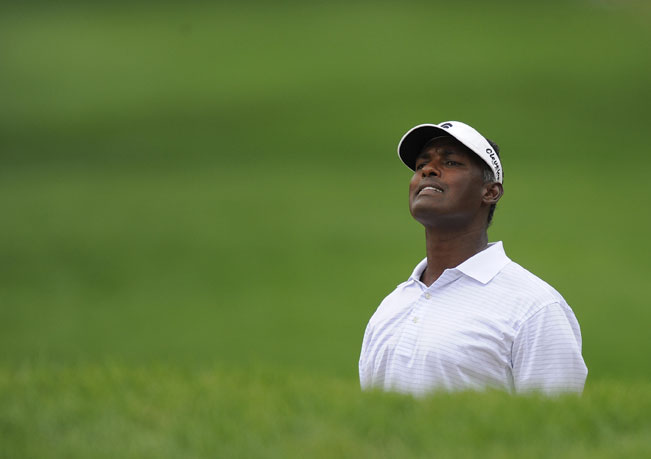Vijay Singh during the third round of the 2009 PGA Championship.
The stigma that comes with being a founded cheater follows a professional player forever. Just ask Vijay Singh, who committed a similar faux paus to Doeden as a 22-year-old at the 1985 Indonesian Open.
Cheating accusations have followed Patrick Reed throughout his professional career, from his time in college at the University of Georgia to being penalized for moving sand in a bunker in 2019 to earlier this year, when he was accused by a fellow pro of cheating at the Dubai Classic; Reed took a drop after he said his tee shot became lodged in a palm tree. However, video showed that the ball had flown through a different tree closer to the hole.
Golf Channel analyst Brandel Chamblee came out with such vigor against Reed’s potential cheating that the 2018 Masters champion sued the television personality, seeking more than $800 million in damages. A federal judge dismissed the suit in November.
Lawsuits about cheating on tour have been happening for five decades. In 1972, after 27 LPGA members signed an affidavit calling for punishment against Jane Blalock, she filed an antitrust lawsuit. The following year, a judge ruled that LPGA players could not police their own (at the time, LPGA players ran the organization themselves).
According to a New York Times story from 1987, the year before she retired, Blalock denied she ever cheated and said she was the victim of older, jealous players as she began to leave her mark on the tour.
Of course, anti-altruist golfers at that level need not just worry about their fellow peers catching them. There are scores of fans watching on television from their homes across the world ready to pounce on any opportunity they may see that rises to the level of a rules violation — even if the golfers are not intentionally cheating.
Then there are the conscientious swindlers. Colloquially known as “sandbagging,” a player deceives his or her competition about their handicap by a number of strokes to gain an advantage.
Professional golf has not been immune from a performance-enhancing drug scandal, either. In 2014, Bhavik Patel became the second player suspended by the PGA Tour for PED use, which he admitted to using in an effort to recover from an injury faster. Patel, who was 24 and only held conditional Web.com Tour status at the time, went on to make 101 starts on what is now the Korn Ferry Tour (four since 2020).
..
Click Here to Read the Full Original Article at Golfweek…
